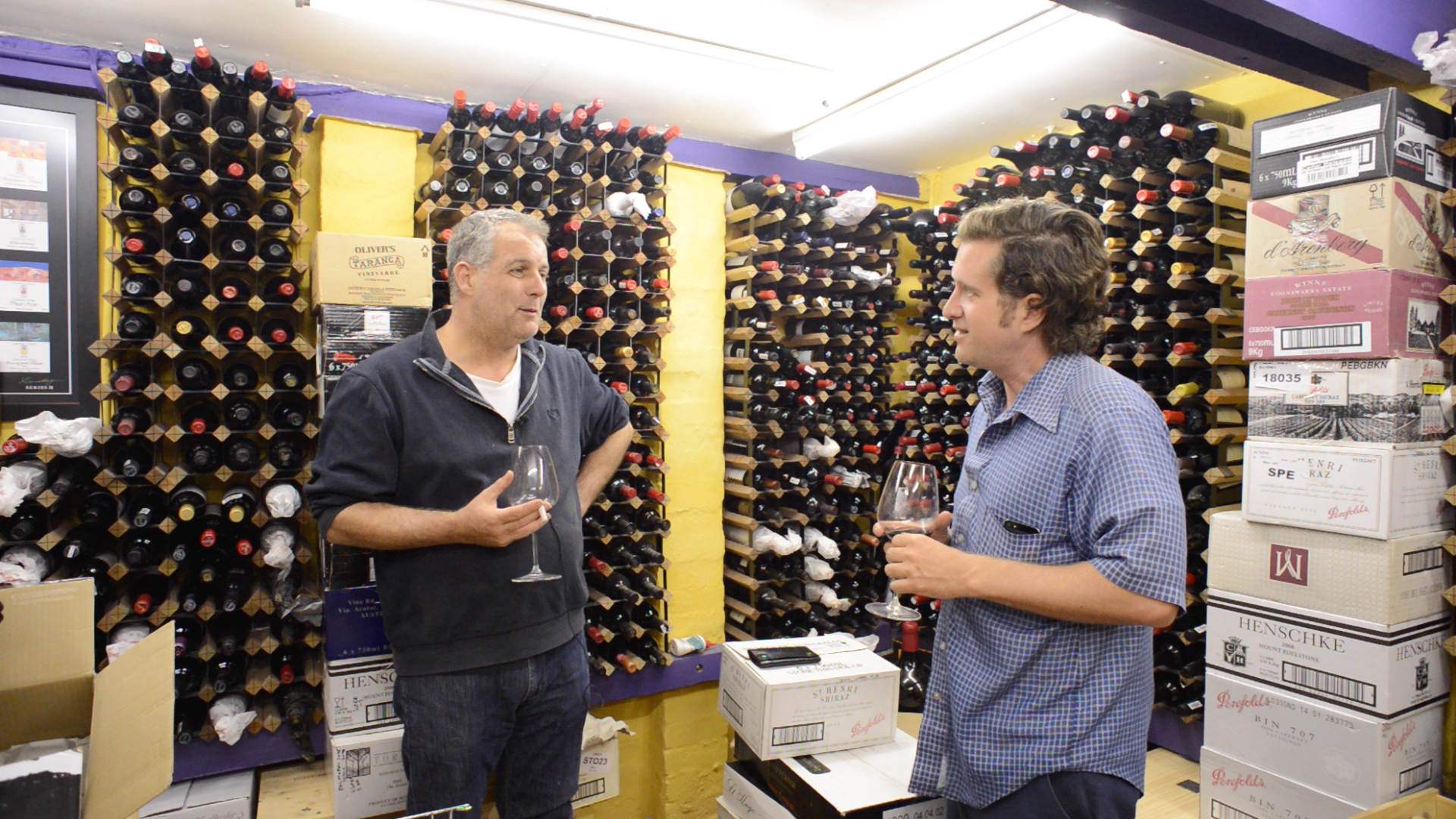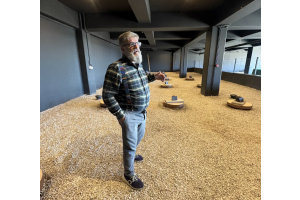
Richard Storch is an Australian wine collector with strong opinions as to why Australia not France makes the best wine in the world. He talks to Grape Collective about why he only collects Australian wine and why Penfolds is like McDonalds.
Grape Collective: Tell us how many wines you have in this collection.
Richard Storch: Probably about 1500, here, in the warehouse, I've probably got another 6,000 bottles, which I probably have about 2,500 items.
Grape Collective: How did you get involved in wine collecting?
Richard Storch: My tastes changed. I started drinking when I was 38, and one of my friends noticed me drinking and was quite surprised, and said "Well I predict, with your nature that within four years you'll be an expert", and 4 years later, he walked through that door and just started laughing. He said "I knew this was going to happen".
Grape Collective: What percentage of the wines in here are Australian?
Richard Storch: Nearly all.
Grape Collective: Nearly all?
Richard Storch: There's some French champagne, that's about it.
Grape Collective: OK. What is it that you think is unique about Australian wine?
Richard Storch: For start, we've got much older vines then everybody else because Phylloxera knocked out all the old French farms in the late 19th century, where as we didn't have Phylloxera here. We've got the oldest vineyards in the world, which means that we can make better wine, and we do. In my humble opinion.
Grape Collective: Tell us a little bit about the differences. You talked about the regionality a little bit before.
Richard Storch: Yeah. You've got the differences of the states, which are like different countries, and then each region can be as different as say France to Germany. Like the difference between Coonawara in South Australia in the south, and Barossa clear in the north that would be the difference between, geographically about the same difference between Bordeaux and Germany. You've got massive differences in terms of climate, in terms of soil, terrain, and in terms of characteristics in the wine itself.
Grape Collective: Clearly you have some very sophisticated wines in this cellar right now. In the world, there's been an up and down perception of Australian wines, and we have the Critter wines in the United States with the cute things that were sort of low cost. International wines ...
Richard Storch: It's poor marketing.
Grape Collective: Poor marketing?
Richard Storch: They should have marketed Australia's as having everything from cheap and cheerful to elite wines. With Australian wines, now essentially you can get a world class wine at a fraction of the cost it would cost from France.
Grape Collective: Tell us about the regions. You have the Barossa, you have the McLaren Vale, you have the Hunter, Victoria, Western Australia. What are the most interesting wines for you?
Richard Storch: Unique wines are the most interesting. Like Pinot Noir or Cabarnet you get eucalyptus upfront, which is totally unique. You also get that in terms of Langhorne Creek Shiraz. You'll get the Red River Gum characteristics through that.
Grape Collective: What is Red River Gum?
Richard Storch: It's a very special wood, and there is a slightly salty finish as well with Langhorne Creek Shiraz. I appreciate the uniqueness of something that we do which no one else can do. For instance, the Shiraz that we had, that was a unique South African clone that was brought over in the late 60s which produces a really rich, powerful, Shiraz, which tastes like nothing else.
Grape Collective: Maybe pick something from one region and then just talk a little bit about the region.
Richard Storch: This is Penfolds 142. That's the oldest Cabarnet vineyard surviving in the world. In 1878 it was planted - only 13 acres. It's usually used as the Cabarnet component of Grange, because Grange is not 100% Shiraz, where it has only been in a couple of vintages. This is the Cabarnet that goes in, and only 5 times that they made a stand alone Cabarnet, and it's awesome. It's the best Australian Cabarnet I've ever had. It's a warm climate Cabarnet, which is almost a contradiction in terms, it's an oxymoron.
Richard Storch: Yep. Barossa's not known for Cabarnet because it's usually too hot. In cooler years, it produces a fabulous, unique wine, and from really old vines, it's massively concentrated and chocolate-y and completely un-Cabarnet like.
Richard Storch: They just put it into the Grange. This is 1996, and it will probably go for another 40 years. It will have to be re-corked twice out of Penfold's. This would sell at auction for about $500 dollars. Online it would probably sell for about $750. That's in top condition.
This was the first vintage of Penfolds 797 in 1964. It was made entirely from block 142. There is a bottle online at the moment for $8,000 dollars. Same as that, but it's got a nicer label. This was re-corked in 2005.
That's the same as Block 142, it's just 22 years older. It's probably got a street value of about $4,000 dollars, because it's coming up to its 50th birthday.
Grape Collective: How long can it go?
Richard Storch: This could go at least another 20 years. It's been re-corked in 2005.
Grape Collective: What do you put on top of that when they re-cork it?
Richard Storch: What they do is they open it up, they inject it straight away with argon. Then they sample it, and they use a current vintage to pop it up. If it's representative of the vintage, if it's still viable. If it's not, they'll put the cork back in and have a nice dinner tonight. But Penfolds does that service for free.
Grape Collective: How many cases did they make that year?
Richard Storch: Not very many ... And they've mostly been drunk. Bare in mind, that this was probably for under 5 pounds in '64.
Grape Collective: What about Western Australia? What are the characteristics of Western Australia?
Richard Storch: It's Bordeaux, but a very powerful Bordeaux.
Grape Collective: What's the climate in Western Australia?
Richard Storch: Very similar to Bordeaux.
Grape Collective: Victoria, that's another big wine region.
Richard Storch: Yeah, though Victoria doesn't produce much Cabarnet of any quality. It produces your massive highly fruited, high alcohol type Shiraz's like this. Absolute massive.
Grape Collective: What's the alcohol in that?
Richard Storch: They say it's 14 and a half, but I don't believe it. I think it's probably 15 and a half. I doubt that there's anything alive in there. With 15% alcohol, there's nothing alive in there. If you're in the mood for something that's going to rock your boat, that's what you'll go for.
Grape Collective: What's the climate of Victoria?
Richard Storch: It's cooler. It's all a relative thing. Compared to Europe, no it's not that cold. In terms of Australia, it's cold climate. We do get cold climate characteristics which is peppery, spicy, sort of characteristics. You range from Rhone styles up to really huge styles. Depending on the soil and climate and so on.
Grape Collective: What about the Hunter? I mean that's ...
Richard Storch: That's warm climate, very warm climate. Theoretically it's too warm, but they produce wonderful Semillon and Chardonnays and things like that, but their Shiraz is a lot more elegant, they are quite Burgundy like. There's not of very much interest to me because I like my wines big.
Grape Collective: Most of the collection in here is South Australian?
Richard Storch: Yeah mostly. Mostly Australian. I've dabbled in Victorian wines, but with Victorian wines, you've got to like spice, and I tend not to like that so much.
Grape Collective: The Barossa and the McClaren Vale or is it mostly the Barossa?
Richard Storch: Barossa, some McClaren Vale, a lot of Coonawara because I'm into Cabarnet.
Grape Collective: What do you have on hand for an extraordinary age Coonawara that you would think about pulling out for a special occasion, you're next birthday for example. What do you think you'll drink when you're in the mood for a nice old Coonawara cap?
Richard Storch: Depends. I'd probably say a special vineyard Wynns, maybe a Wynn's John Riddoch. That's too recent, that's a 99, but I've got 1990. Yeah that's John Riddoch. Wynns have 229 vineyards individual vineyards, and they choose one every year for the John Riddoch.
Grape Collective: And the characteristics that they have are eucalyptus ...
Richard Storch: No. John Riddoch got more chocolate-y characteristics, it's got higher fruit density weight and everything. It's an atypical kind of Cabarnet. It's at a different level.
Grape Collective: You come back to Penfolds a lot. How many Penfolds Grange do you have?
Richard Storch: Probably 3,000 bottles.
Grape Collective: You have 3,000 bottles of Penfolds?
Richard Storch: Yeah. Penfolds is a bit like McDonalds, you know exactly what you're going to get before you even open it. It's totally predictable. A lot of people like that, and they're prepared to pay for it. Now in terms of, do I think Penfolds make great wine, yes. Do I think that it's better value than every thing else that's on the market? Absolutely not.
You can buy things as good if not better at every stage of the game.
Grape Collective: Why is Grange such an iconic wine?
Richard Storch: Because it is a great wine, and it's made to a formula, and people know exactly what they're going to get, and it's got terrific long term viability. Where else can you buy a 50 year old wine where you know exactly what it's going to be like. It's completely predictable. Now whether that's a good thing or a bad thing, it doesn't matter, it's predictable.
Grape Collective: Yeah, OK OK. It doesn't sound like you're that sold on it though, it's like ...
Richard Storch: I appreciate what they've created in terms of the product. In terms of a story, in terms of a sale spiel, I appreciate it. I don't necessarily think that that's the way that I want to go, because I'm an individual. I like to think that I can make better choices. They call that arrogance, but I think there's always another way.
Grape Collective: What do you think, if someone said, "What is the most interesting wine made in Australia", what is that?
Richard Storch: Well I'd say Block 142. That's the Arnold Schwarzenegger in my cellar. If someone said, "I want to have your best wine in your cellar, impress me, money's no object", I'd say well son, you're not going to get better Cabarnet than this.
Grape Collective: The most interesting Shiraz?
Richard Storch: Chris Ringland I think is probably Australia's best Shiraz. Yeah, it's completely unique because Chris Ringland is in one corner of Eden Valley, you only get sun for a certain number of hours a day. He produces a completely unique and makes flavor through his wine. It's totally unique, no one else can do that.
Grape Collective: If you're having a pizza on a normal day, what do you drink?
Richard Storch: Generally something that I'm happy to drink, generally leftovers of something good that I've had before. Life's too short to drink shit wine. That's what Len Evans used to say to my father, and he was right.














